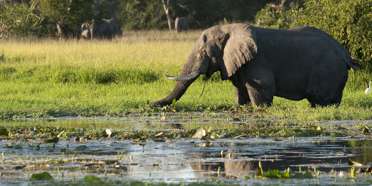- You are here:
- Home
- Countries & Parks
- Mozambique Parks
- Gorongosa National Park
Overview – Gorongosa NP

Philip is a renowned Africa expert and author of many guidebooks to African destinations, including the Bradt guide to Mozambique.
Philip is a renowned Africa expert and author of the Bradt guidebook to Mozambique.
Philip is the author of the Bradt guidebook to Mozambique.
Gorongosa National Park was once one of Africa’s finest wildlife destinations. Sadly, it was abandoned and depleted of animals during the civil war. Despite many setbacks, big efforts have been made to rehabilitate Gorongosa. Today, although far from fully recovered, the park is once again a great safari destination. One that is far away from any crowds.


Pros & Cons
- Good wildlife viewing and superb birding
- Off-the-beaten-track destination
- A chance to support a great conservation effort
- Community development projects and village visits
- Game drives as well as walking, boat and canoe safaris
- Only one lodge in the park, at the entrance, with little bush appeal
- Ongoing political unrest in the area
- Self-drive is not allowed at present for security reasons
Gorongosa NP Safari Reviews
Wildlife
You’ll be taken on game drives in an open safari vehicle. Your guide is likely to show you elephants and lions and a big variety of antelope such as waterbuck, nyala, bushbuck, greater kudu and maybe even sable. Buffalo are harder to spot. If you take a boat trip on Lake Urema, you’ll see plenty of hippos and monstrous crocodiles as well as a wealth of waterbirds.
Scenery
Situated at the very end of Africa’s Great Rift Valley, Gorongosa has a large variety of landscapes. These include Lake Urema and its network of rivers; vast floodplains, savannahs and woodlands; and rainforest on Mt Gorongosa. A hike to Morumbodzi Falls on the mountain is a great addition to a safari.
Activities
All activities at Gorongosa are guided. Self-drive is currently not allowed. A walking safari is always a nice change from the usual game drives in open safari vehicles. Also, don’t miss out on a boat safari on Lake Urema, or a scenic canoe trip with morning coffee or sundowner drinks on the Pungué River. Furthermore, you can visit the local communities on a cycling trip or spend a full day exploring Mt Gorongosa. If you’re a birder, you might want to go on a birding adventure with a specialized guide.
Weather & Climate
The climate in Gorongosa is hot and tropical. The Dry season (May to October) is cooler than the Wet season (November to April), although temperatures start rising in September. The wettest months are from November to March, when afternoon showers can be expected most days
Best Time To Visit
The best time for wildlife viewing is during the middle and end of the Dry season, from July to October. Conditions improve as it gets drier, when animals stay around water sources that haven’t dried up. Wildlife tends to disperse during the Wet season (November to April) and travel conditions can be difficult at this time. In fact, the park closes from mid-December to the end of March.
Want To Visit Gorongosa NP?
Gorongosa NP Safari Reviews
- Expert Rating
- Wildlife
- Scenery
- Bush Vibe
- Birding
- User Rating
- Wildlife
- Scenery
- Bush Vibe
- Birding
Most Helpful Expert Review

Heather is a British travel / conservation journalist, and has written for publications and broadcasters such as the BBC, Departures, the Telegraph and the Sunday Times.
Wild Gorongosa Is One for Science, Conservation and Nature Enthusiasts
Gorongosa is a park for more experienced safari-goers. The wildlife here is still recovering after being hit hard by Mozambique’s 16-year civil war that ended in 1992 – the elephants are particularly nervous of people. But recovering it...


 Mozambique Parks
Mozambique Parks
